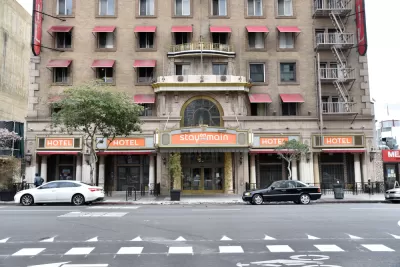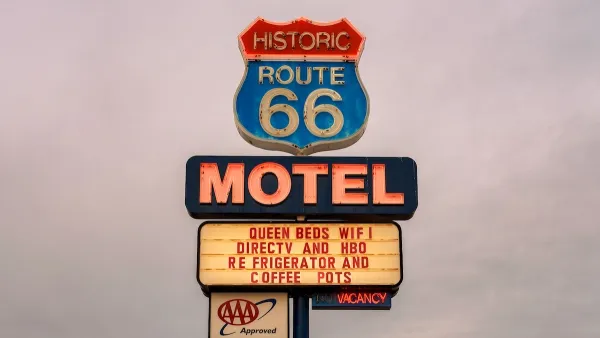An analysis of Los Angeles properties found that the city could make a significant impact on its housing shortage by converting commercial buildings to housing.

A new report found that the conversion of commercial buildings to housing could help Los Angeles reduce its critical housing shortage and boost the availability of affordable housing. According to an article by Jessica P. Ogilvie, "Researchers at the RAND Corporation, which published the report, said that such adaptive reuse could provide 9% to 14% of the housing L.A. County needs to build over the next eight years."
Because of their existing infrastructure, "Of the available options, hotels and motels would be the most feasible, said Jason Ward, the study's lead author and an economist at RAND, in a statement. Existing rooms could simply be converted into housing units."
The city experimented with this approach during the pandemic, when Project Roomkey provided emergency temporary housing in hotels and motels that were already experiencing high vacancy rates due to COVID-19 restrictions.
Even prior to the pandemic, L.A. has a successful history with adaptive reuse, which was streamlined by a 1999 city ordinance. "A paper published last year by UC Berkeley’s Terner Center for Housing Innovation found that between 2014 to 2019, L.A. created about 28,000 housing units on commercially zoned land — far more than any other large metro area in California," notes Ogilvie.
"The report issued by RAND identified about 2,300 commercial properties that could be appropriate for reuse," which could yield up to 113,000 units of housing.
FULL STORY: Why Underused Hotels, Motels Could Be The Faster Path To Easing L.A’s Affordable Housing Gap

Planetizen Federal Action Tracker
A weekly monitor of how Trump’s orders and actions are impacting planners and planning in America.

Maui's Vacation Rental Debate Turns Ugly
Verbal attacks, misinformation campaigns and fistfights plague a high-stakes debate to convert thousands of vacation rentals into long-term housing.

San Francisco Suspends Traffic Calming Amidst Record Deaths
Citing “a challenging fiscal landscape,” the city will cease the program on the heels of 42 traffic deaths, including 24 pedestrians.

Defunct Pittsburgh Power Plant to Become Residential Tower
A decommissioned steam heat plant will be redeveloped into almost 100 affordable housing units.

Trump Prompts Restructuring of Transportation Research Board in “Unprecedented Overreach”
The TRB has eliminated more than half of its committees including those focused on climate, equity, and cities.

Amtrak Rolls Out New Orleans to Alabama “Mardi Gras” Train
The new service will operate morning and evening departures between Mobile and New Orleans.
Urban Design for Planners 1: Software Tools
This six-course series explores essential urban design concepts using open source software and equips planners with the tools they need to participate fully in the urban design process.
Planning for Universal Design
Learn the tools for implementing Universal Design in planning regulations.
Heyer Gruel & Associates PA
JM Goldson LLC
Custer County Colorado
City of Camden Redevelopment Agency
City of Astoria
Transportation Research & Education Center (TREC) at Portland State University
Jefferson Parish Government
Camden Redevelopment Agency
City of Claremont





























